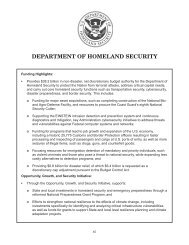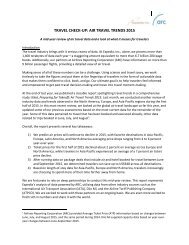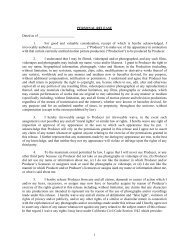A-HRC-13-42
You also want an ePaper? Increase the reach of your titles
YUMPU automatically turns print PDFs into web optimized ePapers that Google loves.
A/<strong>HRC</strong>/<strong>13</strong>/<strong>42</strong><br />
page 12<br />
Principles for the Protection of All Persons under Any Form of Detention or Imprisonment,<br />
adopted by the General Assembly in its resolution 43/173, in the section entitled “Use of Terms”,<br />
does not purport to provide a general definition. 2<br />
9. Secret detention does not require deprivation of liberty in a secret place of detention; in<br />
other words, secret detention within the scope of the present report may take place not only in a<br />
place that is not an officially recognized place of detention, or in an officially recognized place<br />
of detention, but in a hidden section or wing that is itself not officially recognized, but also in an<br />
officially recognized site. Whether detention is secret or not is determined by its incommunicado<br />
character and by the fact that State authorities, as described in paragraph 1 above, do not disclose<br />
the place of detention or information about the fate of the detainee.<br />
10. Any detention facility may fall within the scope of the present study. It can be a prison,<br />
police station, governmental building, military base or camp, but also, for example, a private<br />
residence, hotel, car, ship or plane.<br />
11. Incommunicado detention, where the detainees may only have contact with their captors,<br />
guards or co-inmates, would amount to secret detention also if the International Committee of<br />
the Red Cross (ICRC) is granted access by the authorities, but is not permitted to register the<br />
case, or, if it is allowed to register the case, is not permitted by the State to, or does not, for<br />
whatever reason, notify the next of kin of the detainee on his or her whereabouts. In other words,<br />
access by ICRC alone, without it being able to notify others of the persons’ whereabouts, would<br />
not be sufficient to qualify the deprivation of liberty as not being secret. However, it is<br />
understood that ICRC, in principle, would not accept access to a detention facility without the<br />
possibility of exercising its mandate, which includes notification of the family about the<br />
whereabouts and fate of the detainee. 3 If ICRC access is granted within a week, 4 it has been<br />
deemed sufficient to leave the case outside the scope of the present study. ICRC access to certain<br />
detainees may only be exceptionally and temporarily restricted for reasons of imperative military<br />
necessity in an armed conflict. 5<br />
2 E/CN.4/1997/4, paras. 69-85.<br />
3 This policy was apparently not strictly followed at the detention facility at the United States<br />
airbase at Kandahar, Afghanistan, according to the testimony of Murat Kurnaz (annex II,<br />
case 14).<br />
4 Compare, for instance, article 70 of the Third Geneva Convention: “Immediately upon capture,<br />
or not more than one week after arrival at a camp, even if it is a transit camp, likewise in case of<br />
sickness or transfer to hospital or to another camp, every prisoner of war shall be enabled to<br />
write directly to his family.”<br />
5 Art. 126, para. 2, of the Third Geneva Convention; art. 143, para. 3 of the Fourth Geneva<br />
Convention.
















